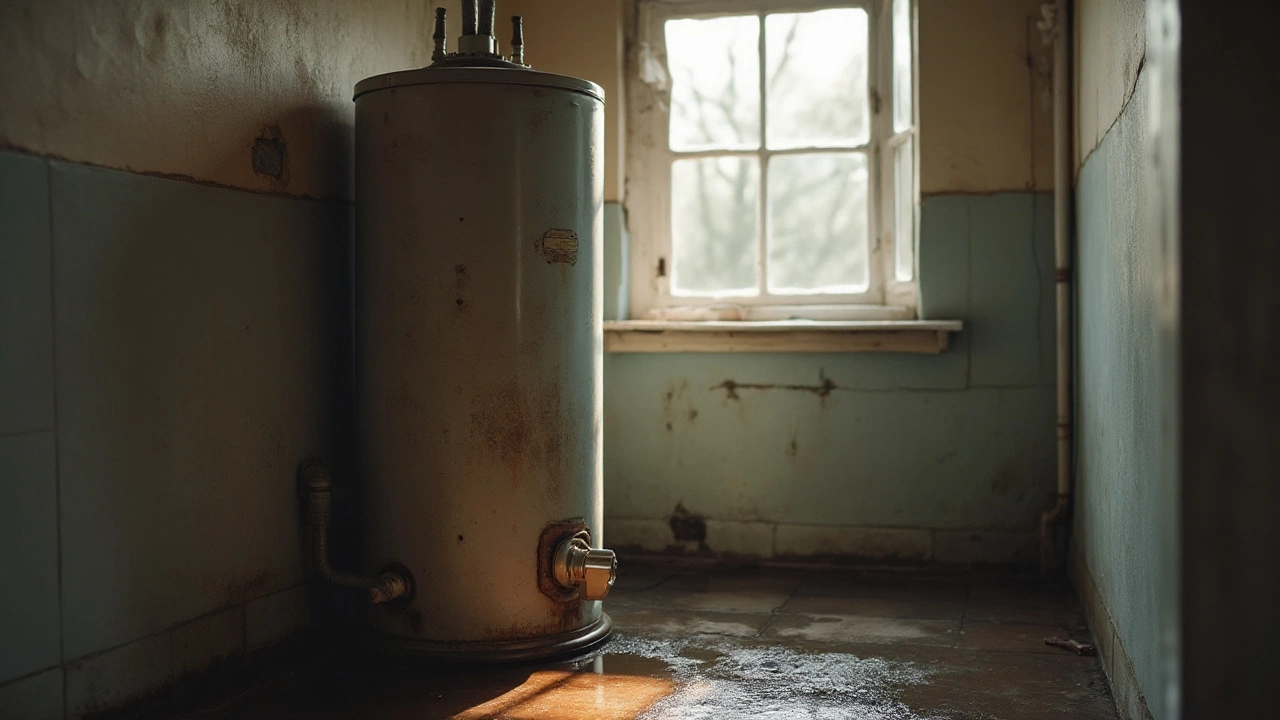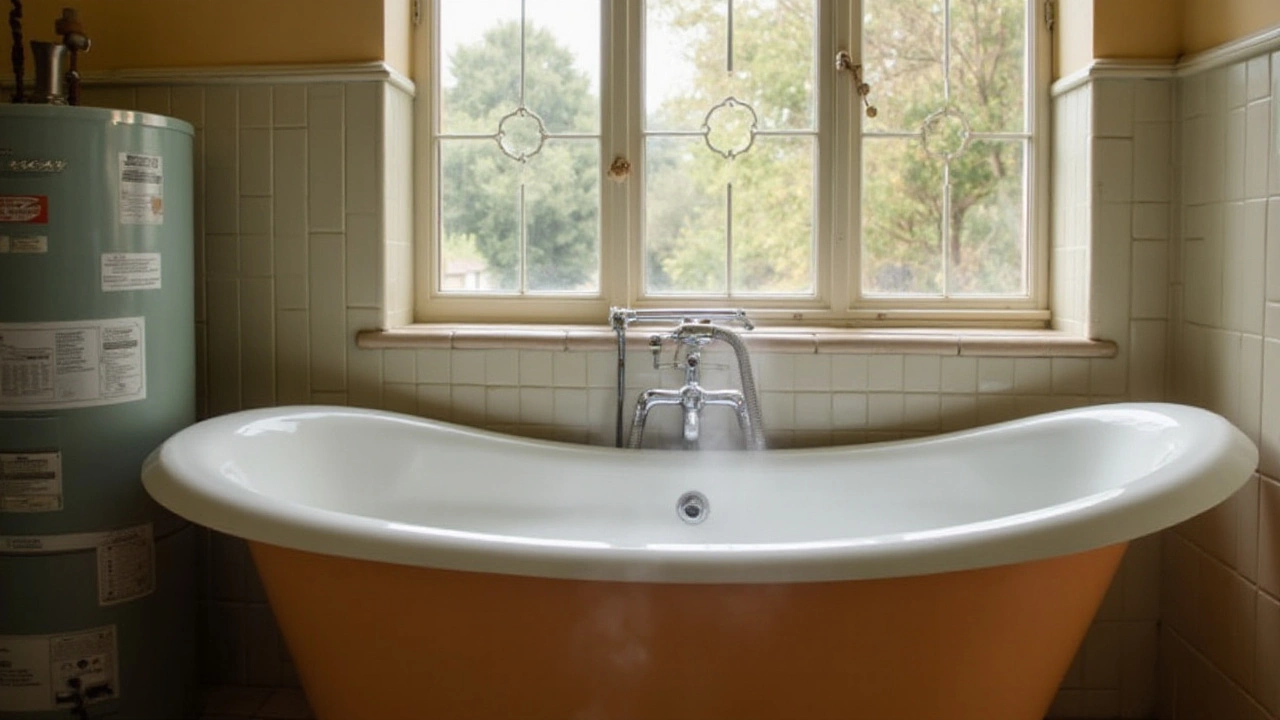A hot water heater plays a vital role in every home, silently providing the warmth we often take for granted during our daily routines. But how do you know when it's time to bid farewell to your old heater and welcome in a new one?
Recognizing the signs of a failing water heater can save you from unexpected cold showers and costly damages. From odd noises to temperature inconsistencies, understanding these signs will help you decide when a replacement is necessary.
This guide aims to walk you through the telltale indicators, discuss common causes behind these issues, and offer practical advice on maintaining your heater for longevity. Read on to ensure your hot water supply remains reliable and robust.
- Signs of a Faulty Water Heater
- Common Causes of Water Heater Failure
- When Repair Isn't Enough
- Preventative Maintenance Tips
- Choosing the Right Replacement
Signs of a Faulty Water Heater
Every appliance in your home has a lifespan, and your hot water heater is no exception. If your showers are getting colder, the culprit may well be a faulty water heater. One of the most noticeable signs is inconsistent water temperature. If while washing dishes the water turns cold quicker than usual, or if the shower fluctuates from hot to lukewarm, it’s a red flag indicating that the water heater isn't maintaining heat as efficiently as it should. Your heater’s age is also a telling factor. Most heaters last about 8 to 12 years. As they approach this milestone, efficiency takes a nosedive, increasing the likelihood of mechanical issues.
Unusual noises are another common sign. A working heater tends to hum quietly, but if banging, clanking, or rumbling sounds start emanating from it, sediment build-up in the tank could be the cause. This not only reduces the heater's efficiency but also indicates possible damage to the internal components, such as the heating elements. These sounds shouldn't be ignored, as they foreshadow more serious problems down the line.
Leaks are an unmistakable sign that something is amiss. Water pooling around the base of the heater strongly indicates internal corrosion, usually leading to irreparable damage. Even small leaks can quickly escalate, leading to water damage within the home. Regular inspections can help catch these issues early. Keep an eye out for rusty water from faucets too. This usually signals corrosion inside the water heater tank, not in your home's piping and often requires the attention of a professional.
Surprisingly, high energy bills can also be linked to a water heater that's on its last legs. As the heater struggles to keep your water hot, it consumes more energy, pushing your bills higher each month. If your energy consumption soars without a clear reason, double-check your water heater conditions. As per Energy.gov, over 20% of your home's energy use is due to water heating, making it vital to ensure your appliance is in tip-top condition.
"A leaking water heater can cause devastating damage to a home, leading to expensive repairs. Regular inspection and timely replacement can prevent unnecessary headaches," - advice from professionals at Home Improvement Experts.
Strange odors emanating from your water supply aren't just unpleasant; they also signal potential trouble. A sulpherous, egg-like smell from taps might hint at bacteria buildup within the heater. Regular tank flushing, which helps eradicate these odors, is an important part of water heater maintenance. If after cleaning, the odor persists, calling in professionals for further inspection could be the solution.
Knowing these early signs gives you a head start on preventing more severe breakdowns and potential disasters. While some minor signs may simply require a part replacement or repair, numerous signs simultaneously indicate that it’s time to contemplate a new unit. Observing these suggestions, paired with regular professional check-ups, can guarantee you enjoy consistent hot water year-round.
Common Causes of Water Heater Failure
Understanding why a hot water heater might fail can be incredibly enlightening and can often point you towards preventive measures you might not have considered. One of the chief culprits is sediment buildup. Over time, minerals in the water, like calcium and magnesium, tend to settle at the bottom of the tank. This buildup can gradually decrease the efficiency of the heater because it makes it work harder to produce the same amount of heat, ultimately reducing its lifespan. Draining your tank regularly can help mitigate this issue, but it’s something that often gets overlooked in day-to-day maintenance.
Another common factor is the corrosion of the tank. This usually starts when the anode rod, which is designed to attract corrosive elements in the water, is fully depleted. Once this protective barrier is gone, rust can start to develop, leading to leaks or ruptures over time. Without proper checks and balances, this can sneak up on you and wreak havoc before you know it. An annual check-up is a proactive step that folks often undervalue but is essential for extending the life of your water heater.
The temperature and pressure relief valve also plays a vital role in maintaining the balance inside the heater. If this valve malfunctions, pressure buildup can occur, which is both dangerous and damaging. The valve’s job is to regulate the pressure and release it when it's too high; without it, you've got a ticking time bomb. Simple checks, like ensuring it isn’t stuck, can prevent possible catastrophic failures.
"Ignoring regular maintenance of your water heater is akin to neglecting oil changes for your car. It’s essential for optimal performance and longevity." - Home Appliance Expert Magazine
In residential settings, another issue is the size of the water heater not matching the needs of the household. A too-small heater has to overwork itself, leading to wear and tear faster than anticipated. This is why choosing the right capacity is crucial when installing or replacing a unit. Consulting a professional can help tailor your choice to your household’s specific requirements, ensuring efficient long-term use.
Last but not least, wear and tear over years cannot be underestimated. Like any appliance, each use and every day add up. Electric water heaters are susceptible to issues such as faulty wiring or thermostat failures, while gas heaters might struggle with pilot light problems or gas control valve failures. These can seem minor initially but can escalate if not addressed promptly. Regular inspections are a simple yet effective safeguard against unexpected breakdowns.

When Repair Isn't Enough
Eventually, every homeowner is faced with the critical decision of whether to repair or replace a malfunctioning appliance, and the hot water heater is no exception. It's tempting to opt for a quick fix, especially when you consider the immediate costs involved. However, consistently repairing a failing water heater can be less cost-effective in the long run than replacing it entirely. So, how can you discern when repairs are no longer a viable option?
One of the clearest indicators that repair may not suffice is the age of the water heater. The typical lifespan of a standard water heater is about 8 to 12 years. If yours is nearing or surpassing this range, it's more likely than not that replacing it would be the most prudent choice. This is not merely an issue of convenience but also concerns efficiency. Older units are typically far less efficient than their newer counterparts. Over time, as the hot water heater becomes less efficient, you'll see a noticeable uptick in your utility bills. Persisting with repairs on an aging unit can lead to a cycle of recurring problems, draining not just energy but your finances as well.
Another red flag that hints at the necessity for replacement is the frequency and severity of repairs. If you find yourself calling the technician for the same issues repeatedly, it's a sign that further repairs might be futile. Chronic problems like consistent leaking, rusty colored water, or fluctuating water temperatures are all warnings that cannot be easily ignored. "It's always a balancing act—considering the cost of ongoing repairs against the potential savings from a more efficient, newer model," highlights an expert from the New Zealand Energy Efficiency and Conservation Authority.
There are situations where safety concerns necessitate a replacement instead of repairs. A malfunctioning water heater can pose serious safety risks, like gas leaks, that should never be left to chance. If you ever suspect a gas leak, immediately evacuate the premises and seek professional help. Similarly, if the pressure-relief valve is faulty, it could lead to the water heater bursting. These dangerous scenarios underscore the importance of acting decisively—sometimes, replacement is the only option.
Replacing a water heater isn't merely about averting imminent problems. It's an opportunity to upgrade to more efficient technology, enhancing overall home efficiency. Modern water heaters are designed with innovative features that not only deliver hot water more effectively but do so while consuming less energy. By investing in a new water heater, you're opting for improved reliability and reducing your carbon footprint, particularly with options like tankless heaters or those driven by renewable energy sources.
Ultimately, the decision to repair or replace is personal and contingent on various factors—age, repair history, safety considerations, and energy efficiency. But equipping yourself with the right information and knowing when to say goodbye to an ailing water heater can save your home from potential mishaps and future expenses. It might seem daunting, but making a well-informed choice now could offer peace of mind for years to come.
Preventative Maintenance Tips
Ensuring your hot water heater's longevity isn't merely about fixing it when it breaks. It's about nurturing its components regularly so that they serve you loyally for years. Think of preventative maintenance as the annual health check-up your heater deserves. The first step involves routinely checking the temperature settings. Keeping your water heater set to a safe yet efficient temperature ensures optimal performance without overburdening the system. Experts recommend placing the thermostat at around 120 degrees Fahrenheit. This not only conserves energy but also prevents scalding and extends the unit's lifespan.
Moreover, sediment build-up in the tank is a common culprit behind many water heater failures. Deposits can hinder efficiency, making your unit work harder than necessary. To combat this, flushing your tank periodically is vital. Aim to perform this exercise at least once a year. It involves draining a bit of water from the tank to wash out the sediment from the bottom. Remember, too much sediment can lead to erosion of the inner lining, which significantly reduces your heater’s viability.
"Regular maintenance is the key to a long-lasting water heater. Neglect leads to problems that most homeowners would rather avoid," says Brad Richardson, editor of Home Heating Monthly.
Checking the anode rod is another preventative measure often overlooked. The anode rod attracts corrosive elements, thereby protecting the tank itself from rusting. Inspect this rod every couple of years, and replace it if more than six inches of the core steel wire is exposed, as it indicates the rod is no longer effective. Additionally, ensure you test the pressure relief valve regularly. Pull the valve's lever to verify it’s releasing pressure properly. If water doesn’t exit, it's time to install a new valve.
Your water heater's surroundings matter too. Keep the area around it clutter-free. Clear access aids not just regular maintenance but also expedited repair if necessary. Furthermore, if your unit is in an unheated space, consider installing an insulating jacket. This helps conserve heat and prevents inactive systems from freezing up during cold spells.
While you may ponder if these steps are tedious or superficial, adherence can significantly reduce the likelihood of costly failures, prolonging your water heater’s service by several years. It's always wise to be proactive rather than reactive. By keeping a simple checklist and marking your calendar for these tasks, you sidestep annoying surprises and the urgent need for water heater replacement.
| Maintenance Task | Recommended Frequency |
|---|---|
| Temperature Check | Every Three Months |
| Tank Flushing | Annually |
| Anode Rod Inspection | Every Two Years |
| Pressure Valve Test | Biannually |

Choosing the Right Replacement
Selecting the right hot water heater replacement involves weighing various factors that align with your household's needs and budget. Before diving into specific models, it's crucial to evaluate the size of your household and how it affects your hot water consumption. A family of three might require a different capacity from a bustling household of six. Understanding the gallons per minute (GPM) and the first-hour rating (FHR) ensures you don't run short on hot water when you need it most. The capacity of the tank should mirror your actual usage patterns.
Beyond capacity, it's essential to consider the energy efficiency of your new water heater. Modern water heaters are designed with efficiency in mind, and opting for an energy-efficient model can save you money on energy bills without compromising performance. Look for heaters with high Energy Factor (EF) ratings, which indicate lower energy consumption. Some homeowners might find value in tankless water heaters, known for their on-demand heating capabilities and minimal standby heat loss, making them a green and versatile choice.
Another crucial factor is whether you should switch from a traditional tank to a tankless system. Tankless heaters often present a higher upfront cost but offer long-term savings on energy. However, if you live in an area with frequent power outages, a tank might be more reliable as it can store hot water for those backup times. Consider your home infrastructure's size, as well, since not all systems can easily accommodate tankless models. Consulting a trusted professional can help weigh the pros and cons effectively.
In this complex decision-making process, budget inevitably plays a role. With a spectrum of prices and technicians’ availability, understanding your financial boundaries while considering both the purchase and installation costs is fundamental. Installation costs might vary, so obtaining quotes from licensed professionals will provide a clearer picture. It's also helpful to inquire about any available rebates or incentives for energy-efficient appliances, which could ease the financial burden.
"Choosing the right water heater isn't just about specs and prices; it's about the right fit for your family and home," says Sarah Thompson, a well-regarded energy consultant. "Consider consulting with local utility companies for their insights and tips on which models are making waves in efficiency and rugged performance."
To ensure you’ve covered all bases, jot down your main requirements and preferences, then scan through available models with a fine-tooth comb. Consider not just the brand's reputation but also reviews from other users. Platforms offering customer feedback can provide uncensored insights into potential issues, helping you prevent unexpected surprises down the line. Remember, a new heater is a long-term investment, and the time spent researching potential fits will pay off through years of uninterrupted service.
Here is a quick comparison of popular water heater types:
| Type | Pros | Cons |
|---|---|---|
| Tank | Lower upfront cost, reliable during power outages | Higher energy bills, limited supply |
| Tankless | Enhanced energy efficiency, endless supply | Higher initial cost, more complex installation |
| Heat Pump | Very energy-efficient, eco-friendly | Require more space, higher initial investment |


